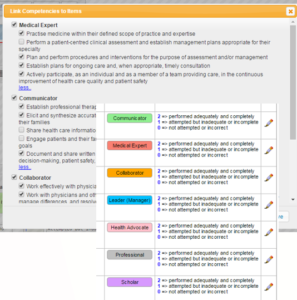Enda Griffin
Client Relations
Competency-Based Medical Education (CBME) is changing the delivery and assessment of medical education in healthcare institutions around the world. CBME is outcome-based education, focusing on what is attained in terms of knowledge, skill, behaviour and attitude. This brings a wider focus to education, not just what is learned from the actual teaching process.
Entrustable Professional Activities (EPAs) are an effective measuring tool for these competencies. An EPA is a core unit of professional practice which can be entrusted to a trainee as soon as they have demonstrated the competence to conduct the task without supervision. Qpercom developed an EPA Management System, Entrust, to provide a digital solution for storing and managing EPAs. An accompanying work-based assessment app measures the trainee feedback, to complete the feedback loop between trainer and trainee.
But what are the benefits of storing and accessing these EPAs digitally over paper?
Read More
Topics:
competency based assessment,
EPAs,
entrustable professional activities,
curriculum mapping,
competency frameworks,
competency management system,
student feedback,
electronic assessment,
big data,
analysis,
medical education,
competency based education,
dataprocessing,
digitalscoring,
programming,
computer science,
cloud storage,
feedback,
milestones,
blueprinting
Dissemination of research findings often takes a long time. However, we are very pleased our research was noticed and published in Ronald Harden's 'Definitive Guide to the OSCE', an important book for those working in the field of medical education (page 147 (ISBN: 978-0-7020-5550-8)).
Read More
Topics:
eAssessment,
clinical assessment,
osces,
objective structured clinical examinations,
medical education research,
communication skills,
medical education,
ronald harden
When Qpercom developed it's unique Observational Management Information System (formerly OMIS, now Observe) in 2007, it very much used a ‘bottom up’ procedure. This is analogous to how module coordinators and exam administrators developed their assessment stations according to the so called ‘check list approach’. This approach is very much focused on ticking the boxes of an item list similar to the lower technology (paper) forms that were used in those days.
Read More
Topics:
eAssessment,
clinical assessment,
competency based assessment,
evidence based training,
curriculum mapping,
competency frameworks,
qpercom observe feature,
competency management system,
qpercom observe,
osces
On Friday, 26th February 2016, Qpercom participated successfully in the National University of Ireland, Galway (NUIG) School of Medicine’s multi-site Year 4 Objective Structured Clinical Examination (OSCE). New from the previous year’s OSCE was the opening of the Clinical Skills Suites at Sligo General Hospital Medical Academy.
Read More
Topics:
eAssessment,
clinical assessment,
osces,
osce setup,
student feedback,
multi-examiner assessment,
electronic assessment,
objective structured clinical examinations,
eosces,
digital scoring technology
In December 2015, Winny Setyonugroho defended his thesis 'The Assessment of Communication Skills During OSCEs: Development and Trialed Implementation of a New Standardised Model Using the MAAS-Global Instrument'. According to the external examiner Dr Marc van Nuland:
"This thesis is original in its introduction of a calibration process for OSCE checklist instruments. This certainly is a valuable contribution to the knowledge and scholarship within the domain of medical education. Further on, researching the effect of having a different first language on the results of communication assessment in OSCE is also of special interest. It is valuable that the candidate has tried to explain the observed differences of students with a different first language compared to native English speaking students from the perspective of the Theory of Working Memory."
Read More
Topics:
eAssessment,
clinical assessment,
osces,
objective structured clinical examinations,
big data,
analysis,
phd,
communication skills,
medical research,
medical education
Multiple Examiners
Unique to Qpercom Observe, the OSCE management information system, are the new Multiple Examiners/Multiple Scenario enhancements. We have frequently read about research empowering the Standardized Patient (SP) to play an important role in examining parts of student’s competence. Only the patient experiences the effects of interpersonal communication, empathy and other aspects that need to be observed and at times marked.
Read More
Topics:
eAssessment,
clinical assessment,
osces,
objective structured clinical examinations,
medical education,
new software rollout,
multiple examiners assessment
A paper on the reliability and validity of OSCE checklists in assessing communication skills by Winny Setyonugroho, Dr Kieran Kennedy and Dr Thomas Kropmans was accepted by Patient Education and Counselling. As part of this research, 250 assessment forms were analysed across four academic terms in order to measure the true caliber of communications skills of OSCE performance. The paper can be accessed via the following link:
Read More
Topics:
eAssessment,
clinical assessment,
osces,
objective structured clinical examinations,
communication skills,
medical research,
medical education,
research paper
Our tech team has successfully overhauled Observe (formerly OMIS) 1.8.5. and are rolling out version 1.9.43 at our home base. Due to the invaluable feedback of clients, module and OSCE coordinators, and other individual users, we have improved Observe functionalities to the maximal standard.
Read More
Topics:
eAssessment,
clinical assessment,
osces,
objective structured clinical examinations,
medical education,
new software rollout,
multiple examiners assessment









